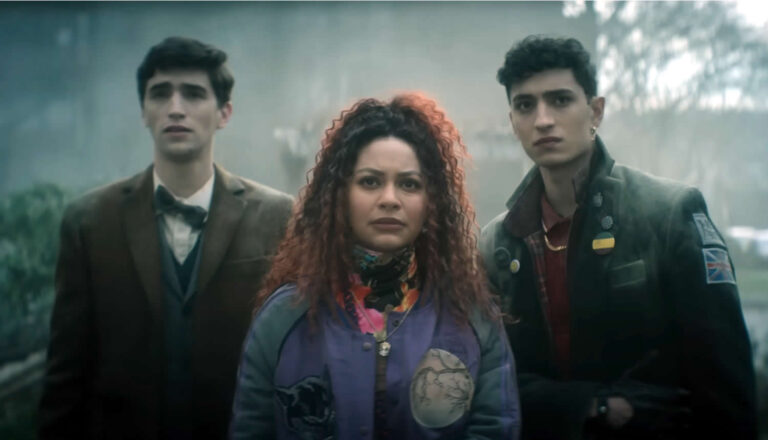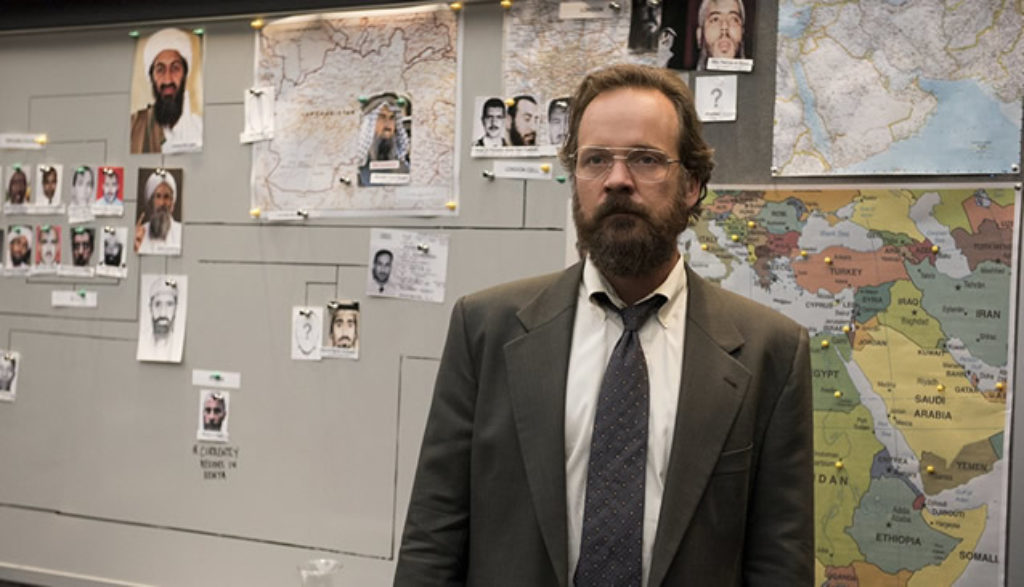
Dead Boy Detectives
Dead Boy Detectives targets teens in style and story. But it comes with very adult, problematic content.

We all remember what happened on 9/11. How could we forget?
Just the way I wrote that first paragraph illustrates how much that day changed everything. We don’t refer to John F. Kennedy’s assassination as 11/3. Even though President Franklin Roosevelt called Dec. 7, 1941 a “day that will live in infamy,” we still need reminders of why that date was so infamous.
But we need not remind people what 9/11 means. We don’t have to refer to it as “the World Trade Center disaster,” or “the terrorist attack that occurred on Sept. 11, 2001.” The date says it all. Most of us can instantly recall where we were and what we were doing on that fateful day.
But the events of 9/11 didn’t instantly manifest themselves from the ether—a fully formed, fully armed creature springing fully imagined from Osama bin Laden’s head. No, 9/11 might’ve not happened at all except for what happened on (to pull a random date out of the air) Dec. 12, 1999. Or Feb. 15, 1997. Or April 2, 1994. The planes might have come from out of the blue, but in the background grew the venomous plant that spawned the attack, watered and fertilized by al-Qaida and … the United States, too?
That day was, according to Hulu’s The Looming Tower, the end of a tragic story—one that began years before. It shows how every step and misstep made by the American government and al-Qaida terrorists before 9/11 led inexorably to a date that, indeed, lives in infamy.
Hulu’s miniseries is based on Lawrence Wright’s Pulitzer Prize-winning nonfiction book, The Looming Tower: Al-Qaeda and the Road to 9/11. But this show’s no documentary: It takes the facts and conclusions of the book and shapes a dramatic narrative from them. Some of its characters are amalgamations of several real people and emblematic of the attitudes of various agencies—agencies that often seem to be as much at war with each other as al-Qaida.
Take Martin Schmidt, head of a CIA Counterterrorism Center called Alec Station (and a fictional composite of several real people). He believes that al-Qaida is a great and growing threat. And when the terrorist organization bombs two American embassies in Africa, he knows what we have to do: strike back and strike hard. Kill bin Laden. Destroy his training camps and financial backers. Cut the head off the snake and be done with it, regardless the cost or ancillary casualties.
John O’Neill (based on a real person) takes a different tack. He’s chief of an FBI Counterterrorism Center known as I-49. That makes him, essentially, a cop, and he views the attacks as crimes. He’s no less determined to mete out justice, but instead of calling in the bombers, O’Neill calls in agents to hunt down the culprits and bring down the organization as he might the Mob. And when he hears of a recent retaliatory strike suggested by Schmidt and his CIA, he knows for sure of one thing it’ll accomplish for the terrorists: “They’ll get a ton of new recruits.”
The FBI and CIA seem incapable of working together, and there are political concerns to weigh as well—considerations that hang heavily over the White House and especially Richard Clarke (another real person), the President’s chief counterterrorism adviser. Yes, al-Qaida is a threat. Yes, it’s important to destroy that threat. But what about collateral damage? Innocent lives? What might be the cost in reputations and elections? Early in the series, we hear that President Clinton is mired in the Monica Lewinsky sex scandal: If Clinton starts calling for bombing runs throughout the Middle East, will the media squawk about how he’s trying to distract national attention from his own unseemly issues?
Meanwhile, the leaders of al-Qaida sit and plot over tea. Its operatives methodically prepare for attacks in unobtrusive corners of Europe and America. And the timer ticks down, day by day.
The Looming Tower is, on one level, riveting television. And despite taking some dramatic liberties, the show’s makers stick closely to the overarching historical narrative here. As such, the series feels weighty and surprisingly gripping, given that everyone in the audience knows how it’s going to end. The Looming Tower needn’t rely on unseemly content to get viewers’ attention.
Alas, it relies on such content anyway. For a show predicated on intra-agency squabbles and high-risk information gathering, The Looming Tower spends a surprising amount of time in the bedroom. Indeed, some of its sex scenes—filled with explicit nudity and obvious movement—might make the makers of HBO’s Game of Thrones blush a little. We hear about folks having multiple affairs, and we’re exposed to plenty of sexualized dialogue. Blue language litters the halls of the White House and elsewhere. And the horrors of this covert war haunt almost every episode, with dead bodies of men, women and children lying lifelessly in the dirt or under piles of rubble.
For all its reportedly slavish devotion to the facts, The Looming Tower feels gratuitously tawdry far too often. And while I haven’t read Lawrence’s award-winning work myself, I’m tempted to step out on a limb and say that in this case, the book must be better.
CIA honcho Martin Schmidt learns that Osama bin Laden is at one of his al-Qaida training camps, and he urges the White House to strike immediately. Meanwhile, the FBI’s John O’Neill and his fellow agents track down a lead in Manchester, England, only to find that their suspect seems to be a model citizen who, mysteriously, just wiped his computer hard drive clean.
O’Neill, frustrated, calls a CIA friend of his to swipe a CIA hard drive in order to get some additional facts on his man. O’Neill’s friend is engaged in an explicit, nudity-filled sex act with a woman when the call comes in. (Only genitals are obscured.) Meanwhile, O’Neill—a man who’s already cheating on his wife with multiple women—sashays over to a table full of females at a Manchester bar, apparently hoping for another illicit tryst. An associate from Scotland Yard looks at O’Neill, muses about his own happy marriage and says, “Must be the worst feeling in the world, huh? Not wanting to go home.” We hear about the Monica Lewinsky-Bill Clinton scandal. An agent calls his girlfriend, who wears a slightly cleavage-baring top. We snidely hear how al-Qaida operatives get aroused by playing with guns.
A missile strike kills lots of people at an al-Qaida camp, including several boys who were playing soccer. (One boy, who survives, tries desperately to revive his obviously dead friend.) An American informant is savagely beaten. Agents roughly handle suspects. People pound on American SUVs. Threats are issued, and we hear al-Qaida leaders plot how to blow up several planes simultaneously—a formative step, it’s suggested, toward what would eventually become 9/11.
We see flag-draped coffins and hear about various terrorist attacks. One interrogator questions a suspect in a Manchester bombing, where blood-related evidence becomes a catalyst for the suspect’s story to unravel. We hear about a bombing attack that injured 4,000 people.
An interrogator and suspect talk about religion and the question of suffering. Women wear head coverings, veils and other outward signs of their Islamic faith. People drink and hang out at bars. Someone’s thrown a cigar. Characters use the f-word more than 20 times and the s-word about five times. We also hear “a–” and one abuse of Jesus’ name.


Paul Asay has been part of the Plugged In staff since 2007, watching and reviewing roughly 15 quintillion movies and television shows. He’s written for a number of other publications, too, including Time, The Washington Post and Christianity Today. The author of several books, Paul loves to find spirituality in unexpected places, including popular entertainment, and he loves all things superhero. His vices include James Bond films, Mountain Dew and terrible B-grade movies. He’s married, has two children and a neurotic dog, runs marathons on occasion and hopes to someday own his own tuxedo. Feel free to follow him on Twitter @AsayPaul.

Dead Boy Detectives targets teens in style and story. But it comes with very adult, problematic content.

An elf mage contemplates on connection and regret as she watches her human friends grow old and pass away.